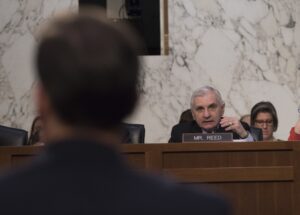
The head of the Senate Armed Services Committee (SASC) said Monday he sees “tremendous controversy” for Congress if lawmakers increase the defense topline while cutting non-defense spending in the upcoming budget cycle. Sen. Jack Reed (D-R.I.), the SASC chair, offered the comment in response to a question on his view regarding House Republicans’ proposed debt ceiling bill, which looks to cap fiscal year 2024 spending at FY ‘22 levels, with GOP lawmakers having indicated defense could be spared from potential…

 By
By 











